We never believe in second chances and Braindump2go brings you the best 70-466 Exam Preparation Materials which will make you pass in the first attempt.We guarantee all questions and answers in our 70-466 Dumps are the latest released, we check all exam dumps questions from time to time according to Microsoft Official Center, in order to guarantee you can read the latest questions!
Vendor: Microsoft
Exam Code: 70-466
Exam Name: Implementing Data Models and Reports with Microsoft SQL Server 2014 Exam
QUESTION 61
Drag and Drop Question
You have a cube named Cube1 that contains the sales data for your company.
You plan to build a report based on the cube.
You need to write an MDX expression that returns the total sales from the first month of the 2009 fiscal year and the total sales from the same period of the 2008 fiscal year.
Which code segments should you insert at line 03 and line 05? To answer, drag the appropriate code segments to the correct lines. Each code segments may be used once, more than once, or not at all. You may need to drag the split bar between panes or scroll to view content.
Answer:
QUESTION 62
Drag and Drop Questions
You are developing reports based on the SQL Server Analysis Services (SSAS) cube named ProcessedOrders.
A Multidimensional Expressions (MDX) query must include a query-scoped calculated member, which computes average sales per order item. The query must also return the set of three states in a query-scoped named set named East Coast Customers.
You need to define the calculations in an MDX query to meet the requirements.
Which four MDX segments should you insert in sequence before a SELECT statement? (To answer, move the appropriate actions from the list of actions to the answer area and arrange them in the correct order.)
Answer:
QUESTION 63
You are developing a BI Semantic Model (BISM) that will be used to analyze complex budgeting and forecast data sourced from a financial database.
The model will be deployed to a server with 28 GB of RAM.
The source data, located in a SQL Server data warehouse, is currently using 15 terabytes of disk space and is doubling in size every month.
The model will be queried by staff in the accounting department by using Microsoft Excel 2010.
You need to ensure the highest query performance and scalability for the accounting department queries.
Which project type should you choose?
A. tabular project that uses the In-Memory query mode
B. tabular project that uses the DirectQuery query mode
C. multidimensional project
D. PowerPivot workbook deployed to SharePoint
Answer: C
QUESTION 64
You are developing a BI Semantic Model (BISM) that retrieves data from several sources including a SQL Azure database and an OData data feed.
The model will be deployed to a server with significantly more memory than the total size of the source data.
You have the data feed URL, which you will use when developing the model in SQL Server Data Tools (SSDT).
The model must meet the following requirements:
– Maximize performance
– Data latency of up to one month is acceptable
You need to choose a project type and a data access mode to meet the requirements.
What should you do?
A. Select the tabular project type and use the In-Memory query mode.
B. Select the multidimensional project type and use the MOLAP storage mode.
C. Select the tabular project type and use the DirectQuery query mode.
D. Select the multidimensional project type and use the ROLAP storage mode.
Answer: A
QUESTION 65
You are developing a SQL Server Analysis Services (SSAS) cube.
The cube contains several dimensions, a local measure group, and a linked measure group.
Both measure groups use MOLAP partitions.
You need to write-enable one of the linked measure group partitions to support Microsoft Excel 2010 PivotTable What-If Analysis.
What should you do before the partition can be write-enabled?
A. Implement the linked measure group as a local measure group.
B. Implement the local measure group as a linked measure group.
C. Set the Type property of the partition’s measure group to Forecast.
D. Set the StorageMode property of the linked measure group to Rolap.
Answer: A
QUESTION 66
Hotspot Question
You are developing a SQL Server Analysis Services (SSAS) cube.
You are writing the following Multidimensional Expressions (MDX) statement for use by a calculated measure.
The measure computes the sales amount for the same time period of the previous year. (Line numbers are included for reference only.)
You need to complete the MDX statement.
Which MDX function should you use in line 03? To answer, select the appropriate MDX function in the functions list.
Answer:
QUESTION 67
Drag and Drop Questions
You are developing a SQL Server Analysis Services (S5AS) cube.
You need to add a calculated member to the Customer dimension to evaluate the sum of values for France and Germany.
Which expression should you use? (To answer, drag the appropriate expression to the answer area.)
Answer:
QUESTION 68
Hotspot Questions
You are developing a SQL Server Analysis Services (SSAS) cube for the accounts department. You create a measure group named Exchange Rate that consists of measures pertaining to currency exchange rates.
One of the measures in this group is named Average Rate and it will be used to report the average currency exchange rate over time.
Currently the AggregationFunction property for the Average Rate measure is set to Sum.
You need to ensure that Average Rate measure reports the average of the currency exchange rate over time.
Which value should you select for the AggregationFunction property for the Average Rate measure? To answer, select the appropriate setting in the answer area.
Answer:
Explanation:
AverageOfChildren
Specifies average of leaf descendants in time. Average does not count an empty value as 0.
QUESTION 69
You are developing a SQL Server Analysis Services (SSAS) cube for the sales department at your company.
The sales department requires the following set of metrics:
– Unique count of customers
– Unique count of products sold
– Sum of sales
You need to ensure that the cube meets the requirements while optimizing query response time. What should you do? (Each answer presents a complete solution. Choose all that apply.)
A. Place the measures in a single measure group.
B. Place the distinct count measures in separate measure groups.
C. Use the additive measure group functions.
D. Use the semiadditive measure group functions.
E. Use the Count and Sum measure aggregation functions.
F. Use the Distinct Count and Sum measure aggregation functions.
Answer: BF
QUESTION 70
Drag and Drop Questions
You are using Multidimensional Expressions (MDX) to query a SQL Server Analysis Services (SSAS) cube.
You need to compute the aggregate value of the 10 most-ordered produces in the Product Categories hierarchy.
The Product level is the lowest in the hierarchy.
Which functions should you use to complete the MDX query? (To answer, drag the appropriate functions from the list of functions to the correct locations in the answer area.)
Answer:
Explanation:
– Aggregate:
Returns a number that is calculated by aggregating over the cells returned by the set expression.
If a numeric expression is not provided, this function aggregates each measure within the current query context by using the default aggregation operator that is specified for each measure.
If a numeric expression is provided, this function first evaluates, and then sums, the numeric expression for each cell in the specified set.
– TopCount: Sorts a set in descending order and returns the specified number of elements with the highest values.
– Leaves:
Returns a set composed of all attributes (optionally limited to those belonging to a specific dimension). For each attribute x in the return set, if x is the granularity attribute or is directly or indirectly related to the granularity attribute, the granularity is set on attribute x without affecting the slice. The Leaves function is designed for use inside a SCOPE statement or at the left side of an assignment.
– DESCENDANTS
Returns the set of descendants of a member at a specified level or distance, optionally including or excluding descendants in other levels.
– Incorrect: TopSUM: Returns, in order of decreasing rank, the top-most rows of a table whose cumulative total is at least a specified value.
Braindump2go Offers PDF & VCE Dumps Download for New Released Microsoft 70-466 Exam! 100% Exam Success Guaranteed OR Full Money Back Instantly!
![11022[2] 11022[2]](http://examgod.com/bdimages/b69c5d45892d_7E34/110222.png)
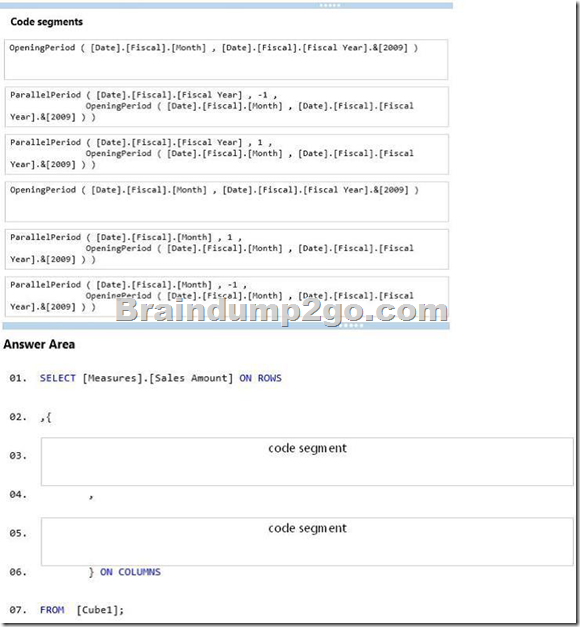
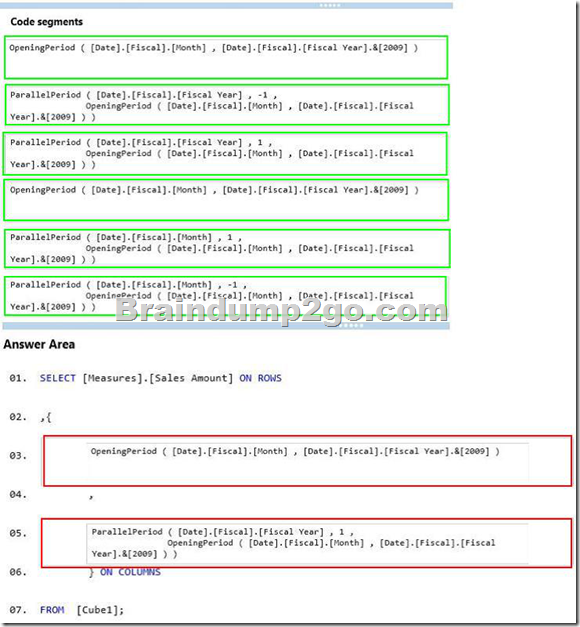
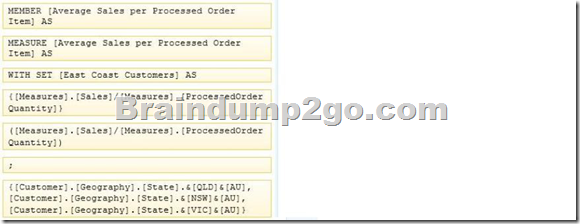
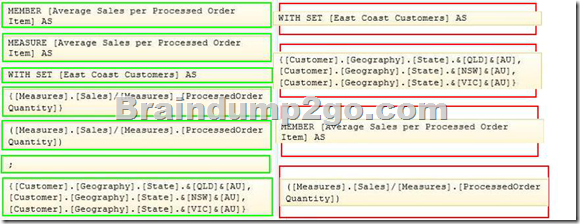

![wpsAB42.tmp_thumb[3] wpsAB42.tmp_thumb[3]](http://examgod.com/bdimages/b69c5d45892d_7E34/wpsAB42.tmp_thumb3_thumb.png)
![wpsD7BF.tmp_thumb[2] wpsD7BF.tmp_thumb[2]](http://examgod.com/bdimages/b69c5d45892d_7E34/wpsD7BF.tmp_thumb2_thumb.png)
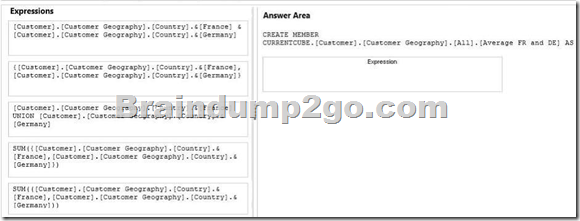
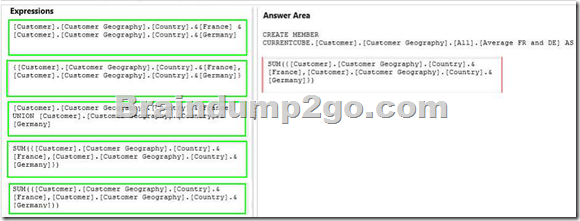
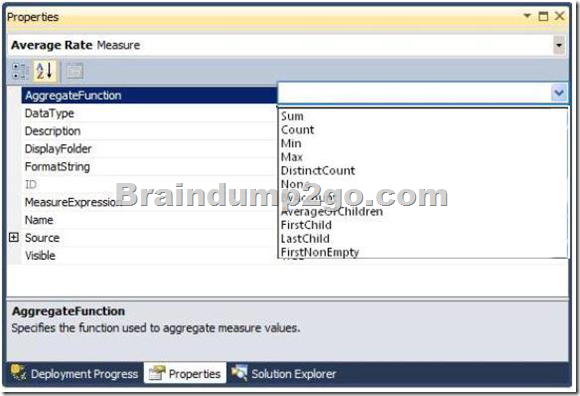
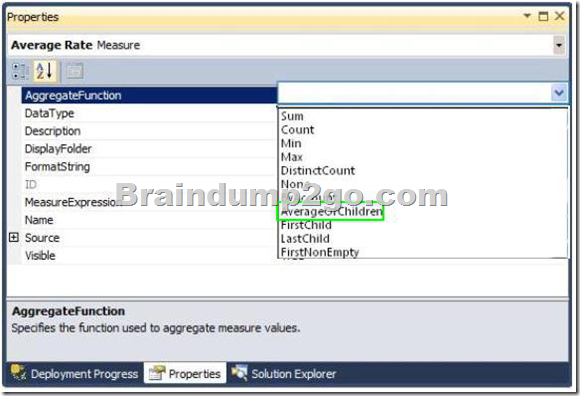
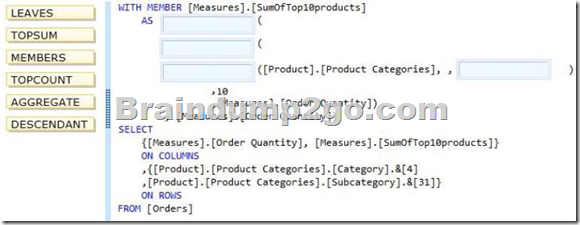
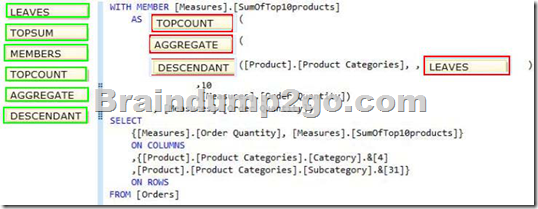
![1522[2] 1522[2]](http://examgod.com/bdimages/b69c5d45892d_7E34/15222.png)





